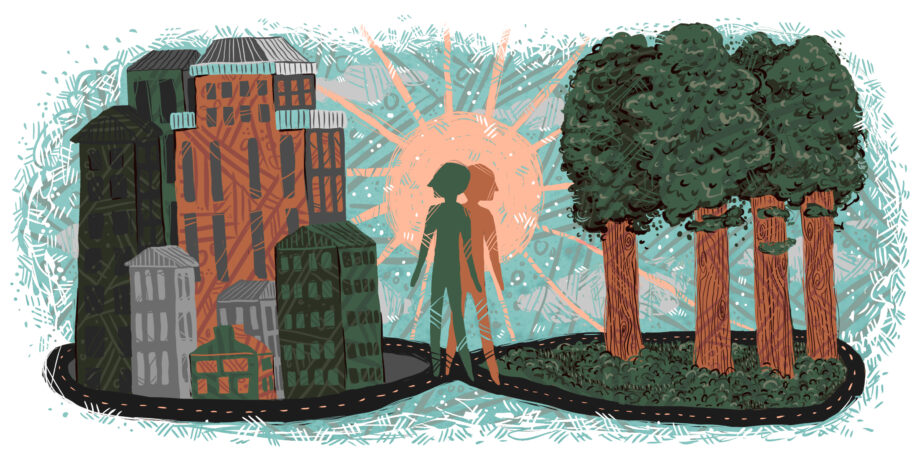December 8, 2012 — More than 2,500 years ago a tiny seed, in the soil of California, began to sprout. Its shoot weaved upward, felt the embrace of the sun for the first time, hardened and continued growing. This sprout became an adult giant sequoia tree, 300 feet tall, 90 feet around, that provided shelter and stage for the dramas and delights of generations of life forms, and shade for innumerable titmice. In the mid-1800s this tree was discovered by Westerners, christened the Mother of the Forest, and promptly stripped of its bark.
While the destruction of such a magnificent tree may seem egregious today, it may be a mistake to believe our actions toward nonhuman life have improved. With each new land conversion, wetland drainage and eagle nest destroyed for a development, we exhibit the same minimal concern for nature that has already led to an extinction rate thousands of times greater than the background rate as well as to the collapse of whole ecosystems. Despite many conservation advances, in the words of David Orr, “the vital signs of Earth still trend downward.”
A challenge for humanity will be to achieve sustainability with minimal loss of nature’s benefits.
Maybe conservation success is so elusive because humans don’t love Earth anymore. After all, humanity’s disconnectedness to nature is profound. Half of us live in cities. Electronic media dominate our leisure time. We lack basic ecological understanding. It is difficult to love an Earth we do not know.
In the absence of love, ethical treatment of the land was “inconceivable” to Aldo Leopold. The African conservationist Baba Dioum agrees: “In the end, we conserve only what we love.”
But why is love so integral to conservation? For one thing, love is an extraordinary motivator. We protect what we love, often through tremendous effort. And Earth certainly appears to be deserving of our affection. She sustains us, providing water catchment and purification, climate regulation, clean air, an astonishing variety of foods, recreation, medicine and a wealth of information locked in the genomes of millions of species for potential use by humans in an uncertain future, not to mention beauty, inspiration and wonder. Experiencing wild nature can reduce stress and bring happiness. There is a peace, as Wendell Berry writes, “where the wood drake rests…and the great heron feeds.”
A challenge for humanity will be to achieve sustainability with minimal loss of nature’s benefits. A Revolution by Natural Affection can help, whereby a critical mass of humans reconnects with nature and creates sufficient social and political pressure to safeguard Earth.
Influencing the thoughts and behaviors of millions of people is no simple task, however. Success will occur when the person on the street understands (1) the Earth is in crisis, (2) the Earth is a better place when nature’s benefits are secured and (3) each of us has a role to play through our consumptive choices and our community and political involvement. Moreover, the person on the street must act on this understanding.
Conservationists and those who understand the environmental crisis and nature’s benefits have an obligation to communicate this information widely. Everyone else has one simple and enjoyable task—get outside, and invite your friends. The rest will follow.
Already the movement has begun with many notable achievements. In Minnesota alone, the National Park Service has committed to getting every child out on the Mississippi River before high school graduation. Friends of the Mississippi River, a nongovernmental organization, connects citizens to the river through clean-up events and photo contests. The Sierra Club, among other organizations, brings inner city youths on camping trips.
The conservation challenge of the 21st century can be viewed as hard work or as an exceptional opportunity for humans to recognize their interconnectedness with each other and all life, and to become involved in a pursuit that could serve as a lifelong source of pride. Given the serious and long-term consequences of a conservation failure, it seems prudent to ask: Can conservation succeed if humans don’t love Earth? Certainly this may be possible—we may protect nature for purely rational reasons. But are we willing to take this gamble and leave love of place, a powerful and durable motivator, underutilized on the shelf? After all, Abraham Lincoln may have been right when he said, “With public sentiment, nothing can fail; without it, nothing can succeed.”
Editor’s note: The views expressed here are those of the author and not necessarily of Ensia. We present them to further discussion around important topics. We encourage you to respond with a comment below, following our commenting guidelines, which can be found here. In addition, you might consider submitting a Voices piece of your own. See Ensia’s “Contact” page for submission guidelines.
Ensia shares solutions-focused stories free of charge through our online magazine and partner media. That means audiences around the world have ready access to stories that can — and do — help them shape a better future. If you value our work, please show your support today.
Yes, I'll support Ensia!
